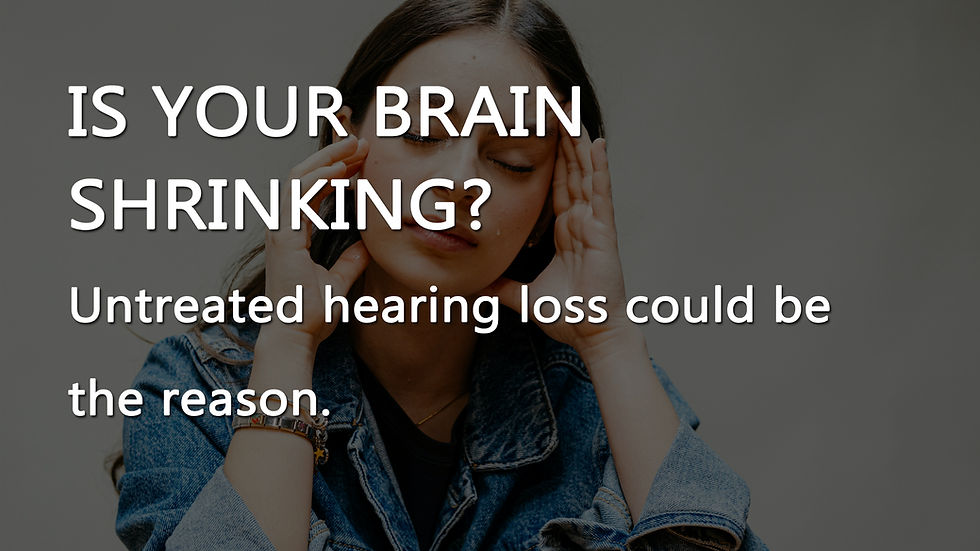WORLD HEALTH DAY... Depression is Deaf!
- Amanda Turner

- Apr 5, 2017
- 3 min read
Updated: Mar 19, 2020
According to Action on Hearing Loss there are approximately 10 million people in the UK with a hearing impairment, 850,000 of whom are profoundly deaf and use British Sign Language (BSL) as their primary form of communication.
That is a staggering 1 in 6 of the population with a hearing loss! By 2031 it is estimated that the current figure of 10 million will rise to 14.5 million.
We are an aging population and the iPod generation is not helping these alarming statistics! Earphones are bad news for our ears people!

If you are profoundly deaf you are 50% more likely to be long term unemployed – this is a shocking statistic with serious implications for the health and wellbeing of the deaf population. It is a well-known medical fact that isolation and loneliness lead to depression and other forms of mental illness.
It is therefore not surprising to learn that if you are profoundly deaf you are also 50% more likely to suffer from depression than your hearing counterparts.
If you are already isolated from your peers, brought up within d/Deaf ethnicity and culture, a strong member of the d/Deaf community but with little contact with the “outside world “ then the routine and benefits derived from regular employment mean your isolation can be total.

English is effectively a foreign language to most BSL users – how do you explain a phonic language to somebody who has little or no concept of phonics? Not an easy task…
Currently in the UK a deaf pupil will leave school with a hoped for reading age of 9. This does not bode well for future work prospects.
Do not assume that all deaf people lip read either – it is a skill and even the most professional of lip readers will only gain 50% or so of a conversation.
When was the last time you watched your TV with the sound muted and tried to lip read? Probably not recently – give it a go! Hard work, isn’t it? How much of your favourite programme did you actually understand? You’re thinking a hearing aid is the answer? Think again! They don’t work for everyone, even if you do have sufficient residual hearing to make this a viable proposition in the first place! Hearing aids magnify ALL sound and can make the wearer acutely uncomfortable in certain environments and situations, eg pubs, clubs and concert venues where the background noise levels are LOUD!
The NHS does provide, but standard issue hearing aids are not particularly attractive. The slick and discreet options advertised on our TV sets are pricey – very pricey! If you are long term unemployed due to a hearing loss, they are probably unobtainable even if you did decide this is the best option for you.
Not a bright and rosy picture is it?
Having found your way to the GP to discuss your problems, it can be difficult to communicate without the benefit of an interpreter. However, these are not always available upon request. So, do you take along a family member to assist and find yourself discussing intimate mental health problems with an unwanted audience?
If you do have an Interpreter, do you feel like sharing your secrets with a stranger (albeit a very professional one) listening in?

Once you have overcome this obstacle, it is possible you may be referred for psychiatric assessment or further assistance. Again, the dilemma of whether to bring along a family member for support or to have an Interpreter present is a very real one for the profoundly deaf patient.
That said, if an Interpreter is required it is not always easy to find somebody willing to work in the Mental Health arena. Current statistics show that there are 42 BSL users to each Interpreter in the London area.
Depressing, isn’t it?
Deafness is a hidden disability; the day to day difficulties of the deaf and hearing impaired are not widely known or appreciated and a lack of awareness compounds their problems.

As we approach World Health Day, spare a thought for those struggling with a hidden disability and go that extra mile in your own efforts and understanding of others. You know it makes all the difference in the world!
Also we would like to encourage you to read to the following link, which gives an insight into a more holistic approach to depression and anxiety, through the benefits of turmeric and its potential antidepressant effects: https://lyfebotanicals.com/health/turmeric-benefits/
We would also stress that with any holistic treatment, you should check with your GP before beginning any health regime.
Don't forget to share this information :) It takes you a few seconds.






Comments